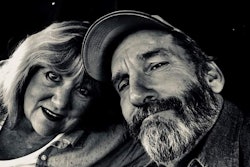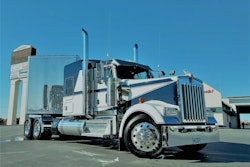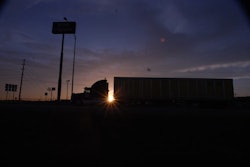At a colossal warehouse in a tiny Midwestern town, I wheel up to the “welcome center” for a drop and hook. A sign greets me: NO TRUCK DRIVERS IN THE WELCOME CENTER.
A team of two security guards emerge, take my nine-digit pickup number, inspect my empty trailer for cleanliness, then instruct me to slide my tandems to the rear. The rite of admission now complete, guard one hands me a load slip, we exchange thank-yous, and I head around the bend to shipping. I scan the paper for the number of my loaded trailer … 314272 … fold the paper, and put it back in my bibs.
There’s perhaps nothing I hate more than backing a 53-footer with the wheels slid all the way to the back in a tight, crowded drop yard. First of all, it makes me look like a hapless greenhorn, if not a perennial incompetent. Seven, eight pull-ups are not uncommon when the wheels are all the way to the back. Not sure how this happened, but it seems I was a better backer at 50 than I am at 60.
Click here to view our full coverage of the coronavirus' impact on the trucking industry from the leading industry publications of Commercial Carrier Journal, Overdrive, Truckers News and Trucks, Parts, Service.
Numbers don’t stick in my head like they used to, so I pull the slip out and read it two or three times, making sure I’ve got the right loaded trailer — 314272, 314272, 314272. Bingo. There she is. By the time I reach the receiving office, the load slip in my bibs is mangled like some wrinkled, miniature scroll. I start to hand it over, but the clerk declines. She instead points to a new sign, instructing all drivers to sanitize their hands before turning in their paperwork.

She is eyeing the load slip on the counter now. Her face contorts into a cocktail of umbrage and fear, as if beholding the finger of a cadaver. I work the sanitizer into my hands, hoping the time and care I take will ease her mind. The Happy Birthday I’m saying in my head becomes a Hail Mary.
She pinches the paper now by the smallest piece of corner she can, holding it by thumb and index finger like a thing defiled. She drops it gently on the desk at arm’s length like a defused bomb that might detonate if not handled carefully. She ascertains the nine-digit number, then sanitizes her hands.
I’m suddenly overtaken by an ineffable shame. I’m not trying to make anyone sick, here. I just can’t get this load to Florida from a laptop. She is flanked, now, by a mountain of a man — the kind they grow out here — a good 6’5″, 350. He is wearing a red bandanna, Lone Ranger-style, and black warehouse coveralls. He now eyes the load slip I unknowingly desecrated, takes a protective half step closer to the woman, and glares at me through his train robber mask.
Duck and Cover! Duck and Cover! The cold war directive now rings in my head. Bert the Turtle instructing school children to duck beneath their desks and cover their heads in case of a nuclear attack.
The little things we lean on in the face of the unknown.
It’s easy to lampoon the measures others take to feel safe, these days. Apologists for the iconic though frequently mocked 1950s civil defense film, shown to schoolchildren everywhere (and by apologists I mean some guy in the comments section on Youtube), maintain that had the people on the far outskirts of Nagasaki’s detonation employed that very tactic, thousands of lives would have been saved.
One can allow that, while not stopping my own germs, sanitizing my hands at the check-in window may have prevented me from transferring the germs from the door. Fresh paperwork now in hand, I put the old Eaton Fuller thirteen in gear, clear the guard shack, and head South, feeling lucky to have gotten out of there without further incident.
I make it to Pioneer, Tenn., get parked up, and hit the Facetime to call Denise. She answers, brandishing a 16-ounce Budweiser now, a glean of mischief in her infinite Irish eyes.
“How’s that social distancing working out for you, Paul?” She takes a pull off a Marlboro menthol.
Well shoot. If she’s going to make herself comfortable, I’m going to grab me an apple.
“Oh… fine.”
“Whatcha got there, Paul? A GA-la?” she chortles.
So this is how it’s going to be? One weekend of state-sanctioned social distancing and she’s a woman scorned?
The rest of the week goes off with barely a hitch. That said, a drivers’ restroom at a customer is closed, with an out-of-order sign. I’m consigned to a camping commode kept stowed in my truck for occasions like this for my morning constitutional. But I got through it, ’cause that’s what we do. (Still, there’s a dumpster near a warehouse smoking area somewhere in the South that may have gotten a little ripe by Wednesday. Just sayin’.)
I kick off my back-haul and make it to the yard, text Denise my ETA, and turn in my paperwork. Back in the truck now, there are two missed calls from her. She picks up immediately.
“Could you maybe pick me up a thermometer?” she says.
“Thermometer?”
She is sobbing now. “I have a fever.”
I head back now to the terminal restroom to, yet again, disinfect. I take a plastic bag with a bar of white Ivory soap out of my coat pocket. It was always my grandmother’s brand.
With a Hail Mary in my head, I wash my hands.











